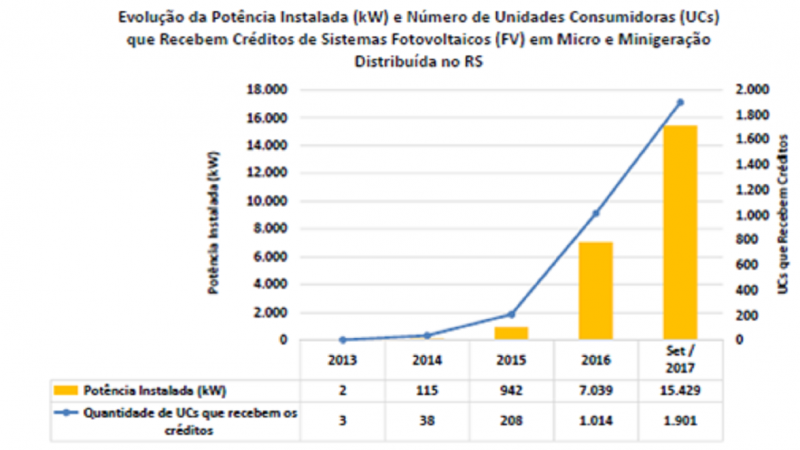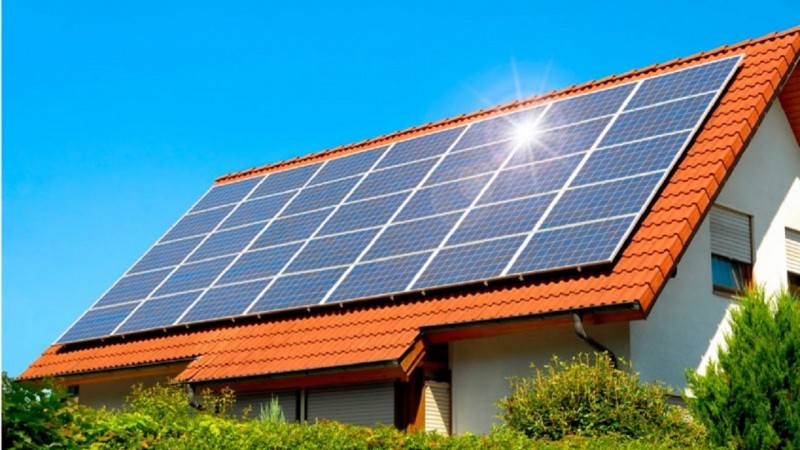Solar Photovoltaic Energy
Brazil is potential for PV generation is among the highest in the world. With most of its territory located in the inter-tropical zone, Brazil receives more solar irradiation than most countries. The average annual solar irradiation in Brazil varies between 1,200 and 2,400 kWh/m²/year. These values are significantly higher than those in most European countries, such as Germany (900 -1,250 kWh/ m²/year), France (900-1,650 kWh/m²/year) and Spain (1,200-1,850kWh/m²/year).
The use of sunlight for the generation of electricity is very recent in Brazil, and significant investments are expected in the coming years. By 2030, 2.7 million consumer units are expected to use solar energy, with investments amounting to R$ 100 billion. Brazil has established public policies to encourage the development of solar energy through funding, incentives to the production chain, auctions for the acquisition of solar energy and the promotion of self-generation, through Distributed Generation.
Distributed Generation allows consuming units to produce energy and make it available in the local distribution network through an electricity compensation system. At the end of 2015, 1,675 consumer units were generating 0.0134 GW under distributed generation, and two years later these figures rose to 16,138 and 0,178 GW, respectively (Aneel). The Ten-Year Energy Expansion Plan 2026 predicts that Distributed Generation will supply 0.6% of the national demand for electricity (EPE).
As for centralized energy generation, two auctions will enable the generation of 3.2 GW up to 2018.
Rio Grande do Sul, in turn, has set public policies targeting solar PV development and ranks among the Brazilian states with the best conditions for the establishment of a productive chain. Counting on a diversified industrial park and prominent universities, Rio Grande do Sul seeks partners to set up solar panels and deliver distributed generation services.
 Rio Grande do Sul has strong expertise in the sectors of metal-mechanics, fine mechanics, electronics and automation. The leading universities of the state are home to research and reference centers for the development of technologies and professional training in solar photovoltaic energy, with emphasis to PUCRS and its Center of Technology in Solar Energy, in the School of Physics, and its Center for Demonstration of Renewable Energies, which offers extension courses for professional training in the area.
Rio Grande do Sul has strong expertise in the sectors of metal-mechanics, fine mechanics, electronics and automation. The leading universities of the state are home to research and reference centers for the development of technologies and professional training in solar photovoltaic energy, with emphasis to PUCRS and its Center of Technology in Solar Energy, in the School of Physics, and its Center for Demonstration of Renewable Energies, which offers extension courses for professional training in the area.
An interesting project of Ala 3, the military organization of the Brazilian Air Force (FAB) in Brazil’ Southern region, established in the city of Canoas, has become a model for future initiatives. Ala 3 will offer an area of 20 hectares, for 25 years, for the construction of a photovoltaic plant, in which part of the energy will be used by the Air Base itself and the rest can be sold on the open market by the company managing the project. Inspired by this project, other air bases of Rio Grande do Sul, such as the one of Santa Maria, are considering the implementation of a similar model.
Guatambu winery, the first in Latin America completely powered by photovoltaic energy, is a remarkable example of the self-production system. The electricity required for grape production and processing is supplied by 600 panels installed at the winery, located in Dom Pedrito, on the Brazil-Uruguay border.
Rio Grande do Sul is responding very quickly to the policies of encouragement of distributed generation, and is currently the second Brazilian state in distributed generation operations, accounting for 12.3% of the installed capacity in Brazil. Rio Grande do Sul counts on an expanding network of companies specialized in the development, approval, installation and maintenance of photovoltaic projects, of 181 establishments spread throughout the State’s regions.
Accordingly, the state government is developing the Solarimetric Atlas to support investment decisions and the development of public policies targeted to the photovoltaic energy. Tax incentives are also provided, as follows:
- ICMS exemption for consumer units that have adhered to distributed generation
ICMS exemption on operations with various equipment and components for the use of solar and wind energy
Sector Opportunities
 Rio Grande do Sul is one of the largest consumer markets for the development of distributed generation, with 4.5 million consumer units that comprise households, industries and commerce, representing a total consumption of 29.43 GWh.
Rio Grande do Sul is one of the largest consumer markets for the development of distributed generation, with 4.5 million consumer units that comprise households, industries and commerce, representing a total consumption of 29.43 GWh.- The state government is willing to support companies interested in producing components of photovoltaic systems, such as modules and inverters.
Business opportunities for partnerships
Look for local opportunities.
